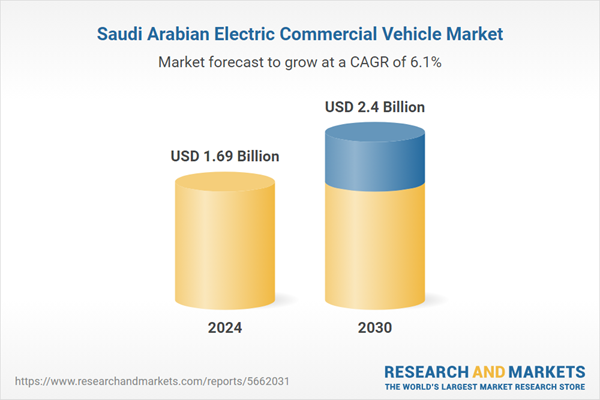Speak directly to the analyst to clarify any post sales queries you may have.
10% Free customizationThis report comes with 10% free customization, enabling you to add data that meets your specific business needs.
Government support, including incentives and infrastructure development, is encouraging the adoption of electric buses, vans, and trucks across logistics, public transportation, and industrial sectors. Major cities like Riyadh and Jeddah are witnessing pilot projects and public-private partnerships to promote fleet electrification. International manufacturers and local players are also investing in assembling and distributing electric commercial vehicles. With sustainability becoming a national priority, the market is expected to grow steadily over the coming years.
Key Market Drivers
Fleet Electrification in Logistics and Public Transport
Saudi Arabia is witnessing a growing trend of fleet electrification in both logistics and public transportation sectors. Logistics providers, courier companies, and last-mile delivery firms are increasingly integrating electric vans and light commercial vehicles into their fleets to reduce operational costs and comply with new sustainability mandates. According to a report by the International Energy Agency (IEA), electric light commercial vehicle (e-LCV) registrations in the MENA region, including Saudi Arabia, grew by over 80% in 2023, reflecting rising adoption across logistics fleets. Electric vehicles offer significant savings in fuel and maintenance costs, making them an attractive long-term investment for fleet managers.In parallel, the public transport sector is undergoing a transformation with pilot programs deploying electric buses in cities such as Riyadh and Jeddah. For instance, the Royal Commission for Riyadh City announced in 2023 the inclusion of electric buses in its public transit expansion plan. Additionally, Lucid Motors’ AMP-2 facility is expected to support public fleet electrification efforts by producing thousands of EVs annually in King Abdullah Economic City. The government and municipalities are actively collaborating with electric bus manufacturers to modernize their fleets. These initiatives are part of broader urban mobility plans aimed at reducing congestion and improving air quality. As demand for e-commerce and urban mobility rises evidenced by a 25% annual growth in online retail deliveries reported by the Saudi Communications and Information Technology Commission (CITC) the demand for electric commercial vehicles is expected to grow substantially in the coming years.
Key Market Challenges
High Initial Costs and Limited Financing Options
The high upfront cost of electric commercial vehicles compared to conventional internal combustion engine (ICE) vehicles remains a significant barrier in Saudi Arabia. Although ECVs offer long-term savings in fuel and maintenance, the initial purchase price of electric trucks, vans, or buses is still considerably higher due to the cost of lithium-ion batteries and advanced components.For small- and medium-sized fleet operators, especially in the logistics and transportation sectors, these high capital requirements can be prohibitive. Additionally, the local financial ecosystem is still evolving to support EV financing. Currently, there are limited leasing programs, subsidies, or green financing schemes dedicated specifically to commercial electric vehicles. Without robust government-backed incentives or tax benefits, many businesses remain hesitant to make the transition.
Key Market Trends
Rising Government-Backed Pilot Programs and Public-Private Partnerships
A prominent trend in Saudi Arabia's electric commercial vehicle (ECV) market is the increasing number of government-led pilot programs and public-private partnerships aimed at accelerating EV deployment. The Saudi Ministry of Transport and Logistic Services, in collaboration with key stakeholders, is actively working to integrate electric buses and trucks into public fleets. For instance, in 2023, the Royal Commission for Riyadh City launched pilot projects deploying electric buses along key routes, contributing to the city’s goal of a 25% shift to clean transport by 2030.Electric buses have also been introduced in Jeddah as part of the Saudi Public Transport Company (SAPTCO) and Jeddah Bus Project, which began trial operations of zero-emission buses in early 2024. These efforts are part of broader urban mobility initiatives designed to reduce emissions and traffic congestion, in line with the National Transport and Logistics Strategy, which targets reducing transport emissions by 18% by 2030.
Key Market Players
- Higer Bus Company Ltd.
- Anhui Ankai Automotive Co, Ltd.
- Yuchai International Ltd.
- Daimler AG
- AB Volvo
- Tesla Inc.
- Mercedes-Benz Group AG
- Toyota Motor Corporation
- BMW AG
- Quantron AG
Report Scope:
In this report, the Saudi Arabia Electric Commercial Vehicle Market has been segmented into the following categories, in addition to the industry trends which have also been detailed below:Saudi Arabia Electric Commercial Vehicle Market, By Vehicle Type:
- Truck
- Bus
Saudi Arabia Electric Commercial Vehicle Market, By Propulsion Type:
- Battery Electric Vehicle
- Plug-In Hybrid Vehicle
- Fuel Cell Electric Vehicle
Saudi Arabia Electric Commercial Vehicle Market, By Battery Type:
- Less Than 50 kwh
- 50 to 250 kwh
- Above 250 kwh
Saudi Arabia Electric Commercial Vehicle Market, By Region:
- Western
- Eastern
- Southern
- Northern & Central
Competitive Landscape
Company Profiles: Detailed analysis of the major companies present in the Saudi Arabia Electric Commercial Vehicle Market.Available Customizations:
With the given market data, the publisher offers customizations according to a company's specific needs. The following customization options are available for the report.Company Information
- Detailed analysis and profiling of additional market players (up to five).
This product will be delivered within 1-3 business days.
Table of Contents
Companies Mentioned
The leading companies profiled in this Saudi Arabia Electric Commercial Vehicle market report include:- Higer Bus Company Ltd.
- Anhui Ankai Automotive Co, Ltd.
- Yuchai International Ltd.
- Daimler AG
- AB Volvo
- Tesla Inc.
- Mercedes-Benz Group AG
- Toyota Motor Corporation
- BMW AG
- Quantron AG
Table Information
| Report Attribute | Details |
|---|---|
| No. of Pages | 85 |
| Published | September 2025 |
| Forecast Period | 2024 - 2030 |
| Estimated Market Value ( USD | $ 1.69 Billion |
| Forecasted Market Value ( USD | $ 2.4 Billion |
| Compound Annual Growth Rate | 6.0% |
| Regions Covered | Saudi Arabia |
| No. of Companies Mentioned | 10 |









